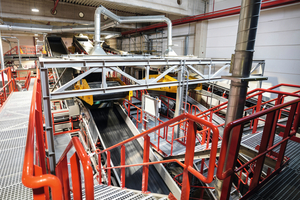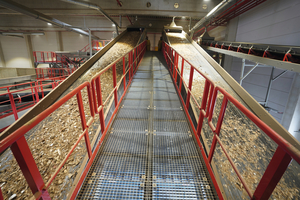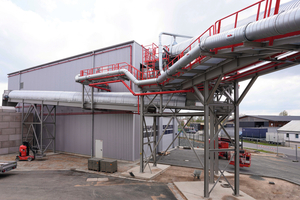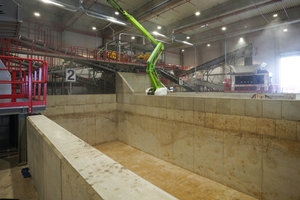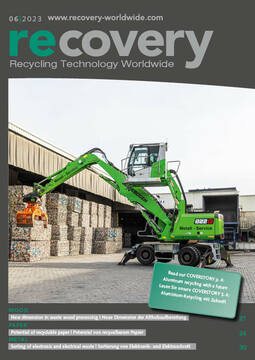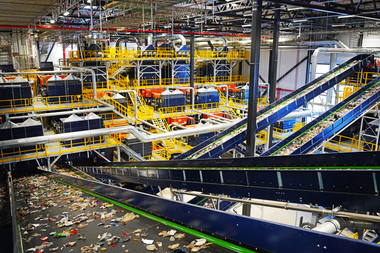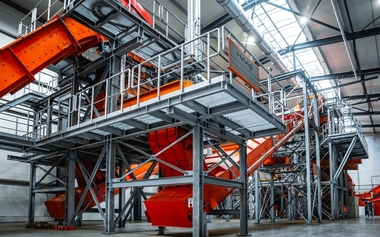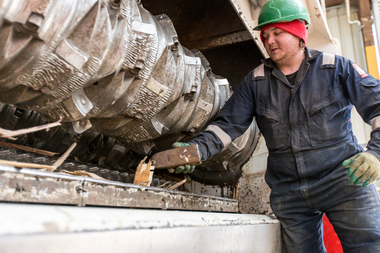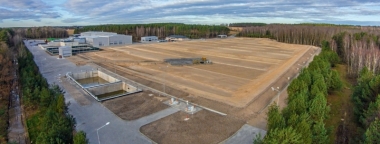A new dimension in waste wood processing
With its new processing plant in Lengede for the environmental service provider Veolia, the Eggersmann Anlagenbau GmbH has raised wood chip production to a level previously unknown in Germany. At the same time, the innovative design ensures maximum plant availability for a safe and constant generation of energy. The industrial processing, which was previously unknown on this scale, shows the importance that waste wood has gained as an alternative energy source.
Uninterrupted wood chip production
In the course of the energy transition, the changeover from coal to waste wood is being carried out in Braunschweig this year – in cooperation with Veolia the Eggersmann Anlagenbau realised the corresponding plant in Lengede for the permanent supply of the biomass cogeneration plant with suitably prepared material. Specifically, 180 000 t of processed waste wood are to be produced annually in accordance with the P100 F20 standard. To prevent supply bottlenecks, various precautions have been taken. The most important of these concern the structure of the process technology. The entire plant consists of two completely self-sufficient systems that run parallel to each other. From the feed area to the shredder, the metal separators and the conveyor belts, every aspect of the processing was installed twice. There are even two different transformer stations, as the production lines also have separate power circuits. Therefore, if one lines stops temporarily, the other simply continues to run. “We have actually built two plants under one roof for Veolia,” explains Danijel Grsic as the responsible Sales Manager at the Eggersmann Anlagenbau. „In the event of an ordinary malfunction or even maintenance, only one production line is at a standstill for that moment. On the other one, processing simply continues. This means that the entire plant is always 50 % available. In this form, this is an absolute novelty in waste wood processing. A simultaneous breakdown of both lines is theoretically possible, but in practice extremely unlikely. Nevertheless, there are provisions for this case as well.”
Temporary storage and deep bunkers
However, uninterrupted production does not guarantee a constant supply of material. For this reason, an intermediate storage was integrated into each of the two process chains. If the sensors on the assembly lines measure too much throughput, the surplus is diverted into these bunkers. If, on the other hand, a shortage of material is detected, finished wood chips are retrieved from the bunker. This enables a homogeneous flow of material into the loading terminal. When the intermediate storages are full and there is enough material in the plant, the contents are sent to several specially designated “Nachtlager” (eng. “night storages”). There, the surplus material can rest until needed. For the easiest and quickest possible emptying, the storages are equipped with moving floor conveyors from BRT HARTNER – these permit trucks filling at a speed of up to 80 t/h.
Precautions against bottlenecks were already taken when the waste wood was handed in: Two deep bunkers, each with a capacity of 1000 m3, allow for sufficient supply even in the event of a prolonged absence of deliveries. In addition, further storage capacities were created on the site for both untreated waste wood and wood chips. “We didn‘t want to leave anything to chance, so we built in several backups,” Grsic explains the additional precautions. “The entire concept is geared towards not only processing the material as efficiently as possible, but also preparing the plant availability for almost any realistic eventuality in the best possible way. We have definitely achieved these goals.”The production facility also has a highly modern fire protection technology and a state-of-the-art filter system implemented.
A joint project of the Eggersmann Group
The environmental service provider Veolia engaged the Eggersmann Anlagenbau as the general contractor for the project. The company is part of the Eggersmann Group, which is divided into the three business areas of construction, recycling and composting. Several subsidiaries were involved in the project. Fechtelkord & Eggersmann was commissioned with the construction work, whereby the group‘s own precast plant BETONT supplied load-bearing concrete elements. This included the assembly of the company‘s largest prestressed concrete trusses to date – 44 m long and weighing 56 t each. For Fechtelkord & Eggersmann, the contract included the completion of both the 4548 m2 production hall and the 348 m2 loading terminal as well as the two deep bunkers, a pump house and a compressed air centre. The latter building also houses the instrumentation and control engineering (ICE). As a specialist for stationary machines, BRT HARTNER was also involved in the project. “We hear a lot about the synergies in our group, but to really experience them is always great,” says Kai Schmidt as the responsible construction manager of Fechtelkord & Eggersmann. “Cooperation and communication are simply different. We know each other and are an already well-coordinated team. As a result, the processes are even more structured and thereby accelerated. Working on such an exciting project together with friends and colleagues from other companies is a special pleasure.”
An important step in the energy transition
The processing plant in Lengede is essential for the planned coal phase-out in Braunschweig, which is to take place in the near future. In early summer, the inauguration of the biomass cogeneration plant that will be supplied by the waste wood processing plant was celebrated. Since May, it has been generating electricity and district heating from the woodchips. Owner and operator is BS Energy; shareholders of BS Energy are Veolia, the city of Braunschweig and the municipal utility association Thüga. A CO2 saving of about 50 % is expected from the switch from coal to waste wood. Waste wood as a raw material offers several advantages: Firstly, wood is a renewable resource and secondly, the process is not dependent on volatile factors such as wind or sun. This makes it an ideal supplement to base-load energy production. The proximity of the plant to the biomass cogeneration plant in Braunschweig also reduces the necessary transport distances.

